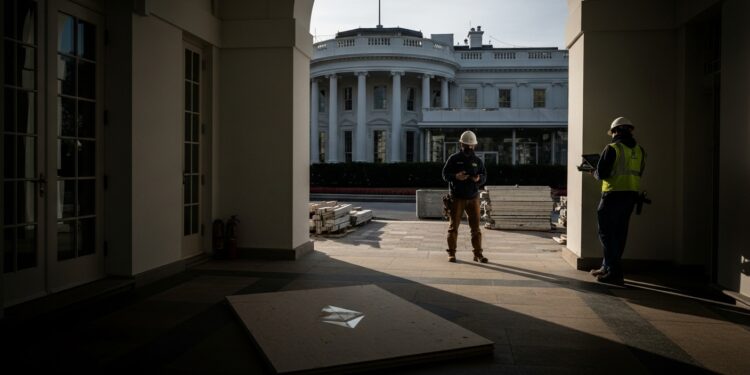A new ballroom is taking shape at the White House. It is a grand project, costing hundreds of millions of dollars. And some surprising names are helping to foot the bill.
- Crypto heavyweights, including Ripple, Coinbase, Tether, and the Gemini founders, are contributing to the funding of a new White House ballroom, alongside traditional tech giants. This marks a significant financial involvement from the digital asset sector in a traditional political endeavor.
- The White House has defended the $300 million ballroom project against criticism, framing it as a visionary, privately funded addition. This project and other political donations highlight a growing alignment between the crypto industry and mainstream politics.
- President Trump’s recent pardon of former Binance CEO Changpeng Zhao further illustrates his engagement with the crypto space, signaling a willingness to interact with and potentially support figures from the industry.
You might expect to see donations from traditional corporate giants. Apple, Comcast, Google, and Microsoft are indeed on the list. But look closer, and you’ll find a distinct digital flavor.
Crypto heavyweights are stepping up. Ripple, Coinbase, Tether, and the Gemini founders, Cameron and Tyler Winklevoss, are among the contributors. Their money is flowing into this very traditional Washington D.C. endeavor.
It makes you wonder, doesn’t it? What does a new White House ballroom have to do with the world of digital assets? The exact amount each donor gave is not yet public. Still, the presence of these names signals something important.
The White House announced the ballroom’s construction in July. It described a massive addition, 90,000 square feet in total. This space could seat 650 people, a truly impressive scale.
The project began in September 2025. Its reported cost is $300 million. This kind of undertaking naturally draws attention, and not all of it has been positive.
Criticism arose, especially after the East Wing of the White House was demolished. Questions about how the administration managed the process also surfaced. It’s a big project, after all, with a big price tag.
The White House, for its part, pushed back. A statement earlier this week called the criticism “the latest instance of manufactured outrage, unhinged leftists and their Fake News allies are clutching their pearls over President Donald J. Trump’s visionary addition of a grand, privately funded ballroom to the White House.” Strong words, indeed.
This isn’t the first time President Trump has received support from the crypto industry. Over the past year, a pattern has emerged. Digital asset firms and their leaders have shown a clear interest in supporting his political efforts.
In August, for instance, Tyler and Cameron Winklevoss made a notable donation. They gave 18 bitcoins to a political action committee (PAC) that supports President Trump. That’s a significant sum, even for them.
Then, in January, more big names joined in. Circle, Ripple, and Coinbase all donated funds to President Trump’s inaugural committee. Circle’s CEO, Jeremy Allaire, reportedly gave $1 million in USDC, a stablecoin (a cryptocurrency designed to maintain a stable value, often pegged to a fiat currency like the US dollar).
These aren’t isolated incidents. The crypto industry played a substantial role in the 2024 elections. Millions of dollars were directed toward key races across the country. It was a concerted effort to influence the political landscape.
Take Fairshake, for example. This political action committee raised over $200 million during the election cycle. Its funding came from large crypto firms, including Ripple and Coinbase. These funds were then deployed to back candidates in important races.
The result? Washington D.C. now has what some observers call the most pro-crypto Congress yet. This shift suggests a growing alignment between the digital asset world and mainstream politics. Support from the top, it seems, is also part of this equation.
Just this past Thursday, President Trump made another move that caught the crypto community’s eye. He issued a pardon for former Binance CEO Changpeng Zhao. Zhao, often known as CZ, had served four months in prison. His sentence related to his exchange’s lax anti-money laundering controls.
This pardon, coming from President Trump, adds another layer to the story. It shows a willingness to engage with, and perhaps even protect, figures from the crypto space. It’s a clear signal, one that many in the industry will interpret closely.
So, we have a new ballroom, funded in part by crypto fortunes. We have a history of donations to political committees. And we have a recent, high-profile pardon. These pieces fit together, painting a picture of a changing relationship.
The lines between traditional power and digital finance are blurring. Money talks, they say, and crypto money is certainly making itself heard in Washington. What this means for future policy, for regulation, and for the industry itself, remains to be seen. But the stage, quite literally, is being set.

















